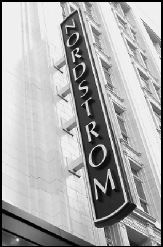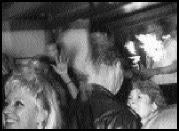FROM NEW YORK Mayor Rudy Giuliani to George W. Bush to Seattle Mayor Paul Schell, the official word on the economy is that spending isn’t just a fun thing to do; it’s your patriotic duty. But with bombs dropping on Afghanistan and new layoff announcements coming almost daily, it’s easy to see why that advice is not being heeded. According to national surveys, consumer confidence is currently at its lowest level since the Gulf War—a fact that, combined with an unemployment rate of nearly 5 percent, is lighting up economists’ phone lines faster than you can say “recession.”
“Now that the counterattack has officially started, people are skittish again,” says UW economist Paul Sommers. “They can say it’s our patriotic duty, but if you’re scared about your job security you might be more concerned about hanging onto your money.”
Nationally, economists say, people are doing just that—delaying big purchases, postponing vacations, and passing up fancy restaurants for happy hours and burger joints. And as goes the nation, so goes Seattle—even more so, some economists say, in light of the 20,000 to 30,000 Boeing layoffs scheduled to start just before the Christmas holidays.
Local retailers are already feeling the bite, with Nordstrom’s same-store sales down 9.4 percent from last September, and sales for Federated Department Stores, the company that owns the Bon March鬠$110 million below the company’s plan since Sept. 11. Sales at Nordstrom’s would have been even lower, according to the company, if not for a companywide sale that started Sept. 28. Although the Bon—unlike Nordstrom’s, which just announced 1,600 layoffs— isn’t planning cutbacks right now, it has suffered from the retail drought. “Our fall plans are basically 1 to 2 percent down from last year,” says corporate communications director Kimberly Reason. Sales are particularly slow, Reason says, in home furnishings—the kind of big-ticket items that are ordinarily “a healthy part of our business.”
Nationwide, retail spending was projected to grow at only about 2 percent in 2001. As a result, retailers have been cutting back on inventories and canceling orders. Dick Conway, a Seattle economic forecaster, observes, “Retailers going into the season were already cautious and were holding less inventory than they had in the past.”
In Seattle, as everywhere, tourism is also taking a hit. With hotel and restaurant sales slumping and travel slowing down all over, 40 downtown hotels have decided to start their winter season early, offering up to 50 percent off their regular rates. “As a way of encouraging travel consumers to come to Seattle, we have moved it six weeks early,” says David Blandford, a spokesman for the Seattle Convention and Visitors Bureau, which is sponsoring the promotion. Schell joined the crowd of Seattle cheerleaders Tuesday, holding a press conference to promote the hotel program and spending in general. Blandford says it’s off to a great start.
So if people aren’t buying cars, homes, and expensive meals, and if they aren’t traveling, what are they doing with their money? Nationwide trends take a while to gauge with any clarity, and even longer to perceive on a local level, but anecdotal evidence suggests that people are staying in, ordering takeout, and renting movies more.
We’ve seen this kind of behavior before—during the Great Depression, when movies became popular as a cheap form of entertainment, and more recently during the Gulf War. The difference this time, economists say, is that people are more uncertain about what the future holds. During Desert Storm, Sommers says, “The objectives were quite specific”; now, no one knows when the war will end or how.
During the Gulf conflict, Conway adds, people already had a sense that the nation was headed for recession. “Desert Storm certainly exacerbated that by causing people to be even more cautious than they would have in a ‘normal’ recession,” he says, but there wasn’t as much uncertainty. “When you have one of these [unanticipated] events and consumer confidence plunges, it gives you very little guide as to how consumers are going to change their behavior in the short run or the long run. You know it’s not going to be good; you just don’t know how bad it’s going to be.”








